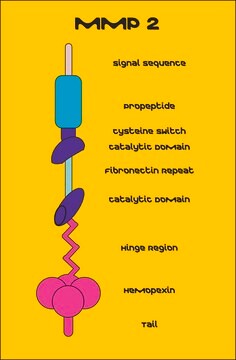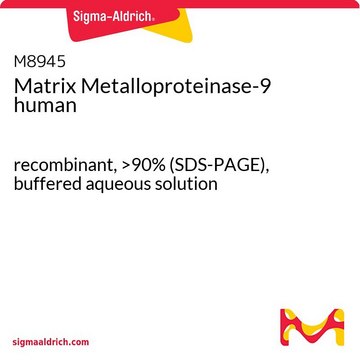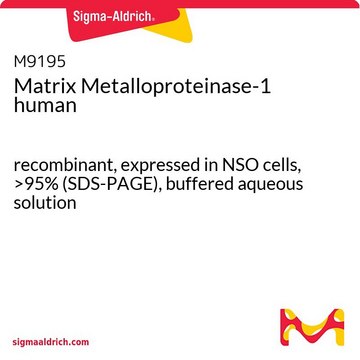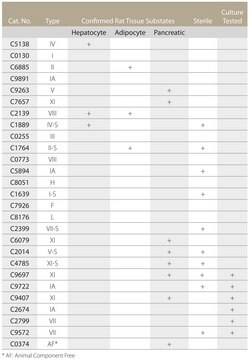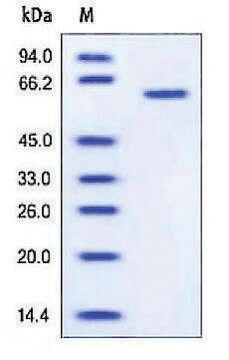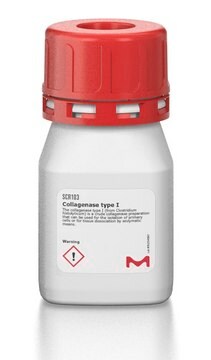M9445
Matrix Metalloproteinase-2 from mouse
recombinant, expressed in NSO cells, >95% (SDS-PAGE), buffered aqueous glycerol solution
Synonym(s):
Collagenase Type IV 72 kDa, Gelatinase 72 kDa, Gelatinase A, MMP-2
Sign Into View Organizational & Contract Pricing
All Photos(1)
About This Item
Recommended Products
recombinant
expressed in NSO cells
Quality Level
Assay
>95% (SDS-PAGE)
form
buffered aqueous glycerol solution
mol wt
apparent mol wt ~72 kDa
shipped in
wet ice
storage temp.
−20°C
Gene Information
mouse ... Mmp2(17390)
rat ... Mmp2(81686)
General description
Matrix Metalloproteinase-2 (MMP-2) also known as gelatinase or type IV collagenase is a 72kDa protein. MMP-2 is a member of matrix metalloproteinase (MMP) family of enzymes. Basic structure of MMP2 contains signal peptide domain that targets the enzyme for secretion, the pro-peptide domain, which is removed when the enzyme is activated and the catalytic site containing gelatin-binding domain.
Specificity
The amino acid sequences 1-662 of the proenzymes of MMP-2 are identical between mouse and rat.
Application
Matrix metalloproteinase-2 (MMP2) human has been used as a standard in zymography to measure proteolytic activity of MMP-2.
Biochem/physiol Actions
Matrix Metalloproteinase-2 (MMP-2) cleaves gelatin, type IV, V, VII, X, and XI collagens, fibronectin, elastin, laminin, proteoglycans and a range of non extracellular matrix (ECM ) components. MMP-2 cleaves native type I collagen to N-terminal ¾ and C-terminal ¼ fragments identical to those generated by interstitial collagenases. MMP2 and MMP9 play an essential role in matrix degradation and they are implicated in the maintenance of neovascularization. In mice, deletion or inhibition of MMP2 protects against myocardial rupture.
MMP-2 degrades general matrix components and may have a role in processes such as host defense, cell proliferation, and protein turnover as well as tissue remodeling.
Physical form
Supplied as a 0.2 μm filtered solution of 25 mM Tris, pH 7.5, 5 mM calcium chloride, 75 mM sodium chloride, 0.025% Brij® 35 and 50% glycerol.
Analysis Note
The biological activity is measured by its ability to cleave a fluorogenic peptide sustrate.
Legal Information
Brij is a registered trademark of Croda International PLC
Storage Class Code
12 - Non Combustible Liquids
WGK
WGK 2
Flash Point(F)
Not applicable
Flash Point(C)
Not applicable
Personal Protective Equipment
dust mask type N95 (US), Eyeshields, Gloves
Choose from one of the most recent versions:
Already Own This Product?
Find documentation for the products that you have recently purchased in the Document Library.
Customers Also Viewed
Gelatinase A
Murphy, G. et al.
Handbook of Proteolytic Enzymes, 497-503 (2004)
INHIBITION OF GELATINASE ACTIVITY OF
MMP-2 AND MMP-9 BY EXTRACTS OF Bauhinia
ungulata L. Kamilla.
MMP-2 AND MMP-9 BY EXTRACTS OF Bauhinia
ungulata L. Kamilla.
Bioscience Journal, 31, 584-590 (2015)
Inhibition of Gelatinases by Vegetable Extracts
of the Species Tapirira guianensis
(Stick Pigeon).
of the Species Tapirira guianensis
(Stick Pigeon).
Longatti T R
British Journal of Pharmaceutical Research, 1(4), 133-140 (2011)
Immunohistochemical expression of MMP-14 and MMP-2, and MMP-2 activity during human ovarian follicular development.
Vos MC
Reproductive Biology and Endocrinology, 12:12 (2014)
P Reponen et al.
The Journal of biological chemistry, 267(11), 7856-7862 (1992-04-15)
We report the isolation of a cDNA clone providing the first and complete sequence of mouse 72-kDa type IV collagenase. The clone contains 2800 nucleotides with a 1986-nucleotide open reading frame coding for 662 amino acids. The amino acid sequence
Our team of scientists has experience in all areas of research including Life Science, Material Science, Chemical Synthesis, Chromatography, Analytical and many others.
Contact Technical Service


